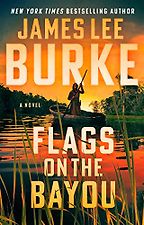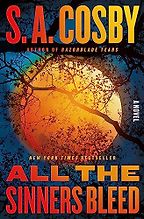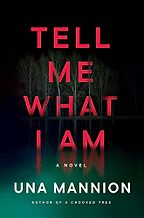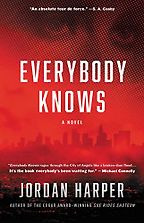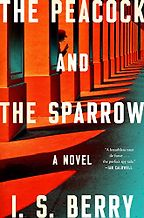There are a number of prizes for crime novels or thrillers, terms that as far as I can make are used loosely to cover all sorts of books—from domestic dramas to international geopolitical incidents—united only in that they have you turning the pages to find out what happens. I read a lot of these, it’s my equivalent of watching TV, so I have my own favourites, but I like looking at prize shortlists to get a sense of which books are well-regarded by others. Picked out by judges—normally themselves crime writers— who scour through dozens of entries, it gives a slightly more objective sense of what’s out there and what’s good. However, this is very much about personal taste and I strongly encourage you to test out Kindle samples of the books (these are free and you don’t need a Kindle to read one). These are books that are supposed to grab you, so it’s worth making sure they do.
In the US, the most highly regarded crime writing prize is probably the Edgar Allan Poe Award for Best Novel. The Edgars have been running since 1954 and are organized by the Mystery Writers of America, the professional organization for crime writers. Previous winners in the best novel category include Patricia Highsmith, John Le Carre, Attica Locke and Ruth Rendell.
In 2024, the winning novel was Flags on the Bayou, a historical novel set in Louisiana during the American Civil War. It’s by James Lee Burke, who has won the award three times before. The story is told from the point of view of an eclectic cast of tormented characters against a diabolical backdrop. Slavery lies at the heart of the story. As one of the main protagonists says, “If they, meaning my fellow human beings, had not cursed themselves with the enslavement of their fellow man, they would have lived in a near-perfect society.” At the back of the book James Lee Burke writes that he considers it his best book yet. There’s a lot more to the book, but in terms of the thriller genre, it’s an ‘on the run from justice’ story.
Also based in the US is the International Thriller Writers association or ITW, which “represents professional thriller authors from around the world.” Its first award dates to 2007 and winners include Stephen King, Jeffrey Deaver, Lisa Gardner and Robert Harris.
In 2024, the winner was All the Sinners Bleed by S.A. Cosby, whose previous books, Razorblade Tears and Blacktop Wasteland also won best novel. All the Sinners Bleed is probably my favourite of the three because the main protagonist is on the right side of the law, so you don’t spend the entire book thinking, “No! No! Don’t do that! It’s not worth it. You’re going to get caught!” Instead, he’s a former FBI agent, now a sheriff in rural Virginia. In terms of genre, this is a police procedural, with a serial killer at the heart of it and race relations as the backdrop. As Stephen King wrote in his review of the book in the New York Times, “As in S.A. Cosby’s previous two novels…the body count is high and the action pretty much nonstop.”
In the UK, the most prestigious thriller prize is probably the Gold Dagger, issued by the Crime Writers Association (CWA), and awarded “for the best crime novel by an author of any nationality, originally written in English and first published in the UK”. The first Gold Dagger was awarded in 1960 for The Night of Wenceslas by Lionel Davidson, one of my favourite thriller writers (the award actually ran from 1955, but was known as the ‘Crossed Red Herring Award’).
The 2024 Gold Dagger was awarded to Tell Me What I Am by Una Mannion, another US author, but who is based in Ireland (Her debut novel, A Crooked Tree, was a bestseller in Ireland). “Haunting and beautifully written, this is a story of a young woman navigating the complexities of a traumatic and unknown past,” the judges of the prize wrote about the winning book. “Mannion deftly explores the impact of crime on all those affected, and will leave readers questioning what it means to be family, and how far they might go for someone they love.” This is really an exploration of domestic violence and control, using elements of the thriller genre to move the story forward.
Also awarded by the CWA is the Ian Fleming Steel Dagger, named after the author of the James Bond books. Fleming’s criterion for a good thriller (apparently) was that “one simply has to turn the pages.” The 2024 winner was Everybody Knows by Jordan Harper. It’s set in LA and is very much a commentary on that world (I found myself googling words I’d never heard before a lot). The main character is a ‘black bag’ publicist, a term coined by Harper. Her job is keeping bad news about celebrities (drug overdoses etc.) from getting out and clearing up literal and metaphorical vomit. In an interview, Harper said his working title for the book had been Hollywood Sickos. In terms of genre, this is firmly LA noir.
Nearly all the thriller awards have a category for debut novelists. This year’s clear winner—winning both an Edgar and an ITW award as well as appearing on numerous best-of-the-year lists in the UK—was The Peacock and the Sparrow by former CIA operative I.S. Berry. This is a classic spy novel, set in Bahrain during the Arab Spring. It was Shane Whaley of the Spybrary podcast who first alerted me to the book last year, pointing out that “it’s very reminiscent of Graham Greene’s The Quiet American, which she says is her favourite book. It’s different, but it’s definitely a love letter, an homage to that work.” As I read it, I occasionally had to remind myself that the main character was an American working for the CIA and not a debauched British journalist.
What’s so valuable about a thriller like The Peacock and the Sparrow is that not only is it a good read, but it’s also a great way into the politics of the Middle East, including how that intersects with US foreign policy—a subject we probably should all know more about.
December 7, 2024. Updated: June 11, 2025
Five Books aims to keep its book recommendations and interviews up to date. If you are the interviewee and would like to update your choice of books (or even just what you say about them) please email us at [email protected]
Five Books interviews are expensive to produce. If you've enjoyed this interview, please support us by donating a small amount.
